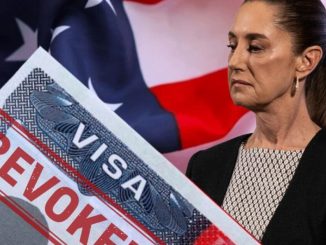
| Published July 9, 2025
The brutal murder of 22-year-old nursing student Laken Riley in February 2024 sent shockwaves across the United States—igniting political debates, prompting new legislation, and cementing her name in the national consciousness. Her killer, José Antonio Ibarra, a Venezuelan illegal immigrant, was swiftly convicted and sentenced to life in prison without parole. For many, the case was closed—justice, though painful, had been served.
But now, more than a year after the verdict, an unexpected legal twist has reopened wounds for Riley’s family and reignited public outrage. In a surprising move, a Georgia judge has approved a psychiatric evaluation for Ibarra, raising the possibility that the convicted murderer could be declared mentally incompetent—casting doubt on the finality of the original trial and sentence.
As the nation watches, a once-settled case teeters on the edge of uncertainty, with critics warning this could be a back door to overturning justice—and advocates calling for deeper scrutiny of how such tragedies are handled within a flawed immigration and legal system.
🧩 What’s New in the Case of Laken Riley’s Murderer?
1. New Court-Ordered Mental Evaluation
-
Convicted murderer José Antonio Ibarra—a Venezuelan national identified as an “illegal alien” who brutally murdered University of Georgia nursing student Laken Riley on February 22, 2024—was under a bench trial, convicted on all counts, and sentenced to life without parole
-
However, on July 8, 2025, Judge Patrick Haggard approved a psychiatric evaluation to determine if Ibarra was mentally competent to stand trial and assist with his defense during post-conviction proceedings
-
The defense argued that Ibarra has a “congenital deficiency” rendering him incapable of understanding legal proceedings or assisting in his own defense—claims not raised during the original trial
-
The prosecutor did not oppose the mental evaluation but noted there was no evidence at trial suggesting he lacked competency
⚖️ Political & Legislative Fallout
-
The murder ignited a political firestorm over U.S. immigration policies. In response, the Laken Riley Act was enacted in January 2025, mandating detention of undocumented migrants charged with serious crimes and empowering lawsuits against the DHS for failing to enforce immigration laws
-
Former President Trump cited Riley’s death multiple times—especially during his March 2025 congressional address—as justification for stricter border enforcement
-
Georgia’s governor also voiced strong criticism after reports emerged that Ibarra may have been transported internally on a free flight—possibly arranged by migrant-relocation programs—triggering calls for improved oversight
⚖️ Resulting Effects of the Mental Evaluation Order
The judge’s decision to allow a psychiatric evaluation for José Ibarra—long after his conviction for the murder of Laken Riley—has sent ripple effects through the legal system, political arena, and public opinion. What was once a closed chapter is now reopening, with several important consequences unfolding:
1. Legal Precedent and Delay in Justice
-
Post-Conviction Twist: Mental competency evaluations are almost always conducted before or during trial. Ordering one after a conviction and life sentence is rare, raising concerns among legal analysts about setting a dangerous precedent.
-
Potential for Retrial: If Ibarra is found incompetent—either now or retroactively—his legal team could request a new trial or sentence review, delaying justice for the victim’s family and the public.
-
Extended Appeals Timeline: This evaluation could prolong the appellate process by months or even years, re-traumatizing the Riley family and straining judicial resources.
2. Political Fallout and Public Backlash
-
Renewed Criticism of Immigration Policy: Ibarra’s illegal entry into the U.S. was already a flashpoint in immigration debates. Any hint that he might escape full accountability will only inflame national outrage over lax border enforcement.
-
Fuel for 2025 Election Season: Political figures—especially those advocating for stricter immigration and public safety laws—are likely to seize on this development to rally their base.
-
Perception of a Broken System: Many Americans, especially victims’ rights advocates, now view the justice system as vulnerable to exploitation, particularly by non-citizens using procedural technicalities.
3. Emotional Toll on the Riley Family
-
Reopened Trauma: For the Riley family, the court’s decision means reliving the horror they thought was behind them. After enduring a highly publicized trial and sentencing, they now face the possibility that their daughter’s killer might receive new legal accommodations.
-
Loss of Closure: What was supposed to be a moment of justice and closure has turned into another painful chapter in an already devastating story.
4. Impact on the “Laken Riley Act”
-
Legislative Urgency Renewed: Lawmakers who supported the Laken Riley Act may use this development to push for even stricter reforms—such as restricting mental evaluations for violent non-citizen offenders.
-
Possible Revisions: Some may call for amendments to the Act to ensure future cases like Ibarra’s are handled more decisively and without reopening legal loopholes.
 Bottom Line:
Bottom Line:
The case of Laken Riley was once seen as an open-and-shut example of justice served—a swift conviction, a life sentence, and a grieving family’s painful closure. But the recent court-ordered psychiatric evaluation for her convicted killer, José Ibarra, has reopened not only legal questions but also a deep national wound. What began as a brutal crime has now evolved into a troubling symbol of the cracks within the justice system—where even the most clear-cut verdicts can be pulled back into uncertainty.
For Riley’s family, the community, and a nation still debating the consequences of open borders and judicial discretion, the path forward is anything but settled. As the legal system reexamines Ibarra’s mental state, many are asking whether justice can truly be called justice if it can be unraveled after the fact. And as public pressure builds, one thing is clear: the name Laken Riley will continue to echo—not just as a victim, but as a catalyst for how America confronts law, accountability, and the true meaning of justice.





Be the first to comment